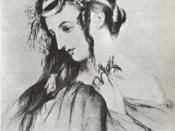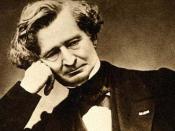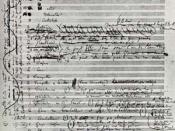During the Romantic period many composers made a huge impact with their music, some with traditional forms and others with new styles, such as program music. One of the composers who became a pioneer in the new program approach was Hector Berlioz with Symphonie Fantastique. As well as being a composer who worked in new, unconventional styles, he also used more traditional genres as well, among these the choral symphony and requiem mass. Ernest Newman wrote this about Hector Berlioz:
"Berlioz was himself, a solitary figure owing practically nothing to other people's music, an artist, we may almost say, without ancestry and without posterity. Mozart builds upon Haydn and influence Beethoven; Beethoven imitates Mozart and in turn influences the practice of all later symphonists. But with Berlioz... there is no one whose speech he tried to copy in his early year, and there is still no one since who tries to speak with his voice."
"Grande Messe Des Morts", Berlioz's setting of the liturgical mass text, may not be a choral work that is suitable for average high school voices, but it is a wonderful example of a large scale romantic work for choir.
Hector Berlioz was born on December 11th, 1803 in the district of Dauphine, France. His mother was a strict orthodox Roman Catholic and his father an atheist physician. In his early life, his father schooled him mostly at home. He was exposed to many subjects, most of which were preparing him
for the medical school training his father intended. At the age of 13, he began to study flute and guitar, but only as a hobby. His father emphasized medicine as his focus and goal.
In 1821, at the age of 18, he left home and was enrolled in a Paris medical school. Berlioz wrote in...


